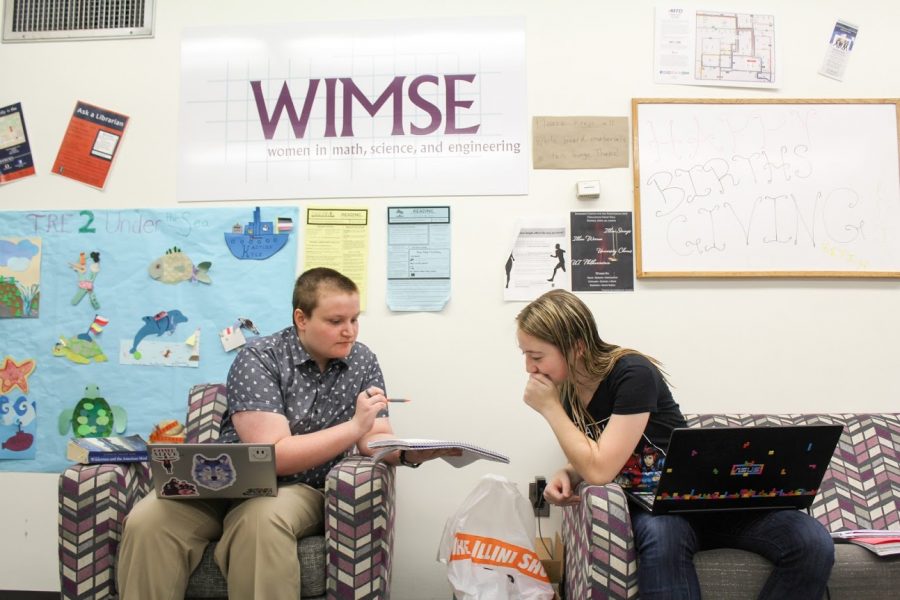Housing option nurtures women in STEM
The Women in Math, Science and Engineering program houses over 130 women in dorms each year. WIMSE focuses on encouraging and supporting women who are entering the male-dominated STEM fields.
May 3, 2018
The University has one of the top engineering schools in the country, according to Business Insider and the U.S. News and World Report. Several resources on campus are dedicated to encouraging women to study STEM fields.
Lydia Khuri is the program director of the Women in Math, Science and Engineering housing option. WIMSE houses 135 women every year. The dorms are 45 percent Engineering students, primarily freshmen. Other women’s majors include math, biology, chemistry and a few social sciences.
WIMSE is a community with a purpose. It will “provide a supportive environment for women to succeed academically and in terms of their career aspiration in the STEM fields,” Khuri said.
WIMSE has a number of benefits that help women in STEM get their foot in the door.
Incoming students meet with peer mentors who are returning students planning community engagement events. The students can tutor each other because many are enrolled in the same classes. WIMSE students are provided networking and research opportunities, and Weekly Wellness provides the women with a chance to check in on one another.
Get The Daily Illini in your inbox!
Minorities pursuing careers in these fields often face barriers, according to Khuri.
“WIMSE is there to counter those things and support women in their pursuits,” Khuri said.
Kaitlin Kanthak, freshman in LAS, resides at WIMSE. Kanthak says she does feel the impact of sexism in her studies.
“There’s always the table of women and then the room of men,” she said.
Kanthak said the benefits of WIMSE are extensive. It provides students with programs and opportunities they otherwise could not access. However, she is not blind to the discrimination many women in STEM fields face once they enter the workforce.
Data from Pew Research Center found 50 percent of women working in STEM fields say they have experienced gender discrimination at work. When looking at computer-related jobs, that number climbs to 74 percent of women.
Kanthak said the stereotype of women as unintelligent or less capable than men still exists. She said she has been talked down to by male classmates in her math classes.
She does recognize the improvements that have been made in these conditions when compared with previous time periods. Kanthak thinks of her grandmother, who she says had so much potential but was not given the same chances as men of her generation. This makes Kanthak aware of how fortunate she is to have the opportunities her grandmother didn’t.
Now, women like Ashley Armstrong are getting the chance to pursue graduate-level work in STEM fields. Armstrong is a third-year graduate student in mechanical engineering. She is also a member of the Graduate Society for Women Engineers.
She said GradSWE focuses on developing friendships and support systems. The group provides aid for members in need.
“Whether that’s career-focused, or any personal issues that are a function of being a woman in STEM, those are the topics of conversation that the support group can work through,” Armstrong said.
In addition to the support systems in place, GradSWE provides opportunities to meet with companies looking to hire. They have bi-weekly lunches and invite speakers from across campus. They can connect individuals to mentors as well.
Armstrong believes the women of today are tasked with a responsibility to bring young girls into STEM fields.
“Most of the leaders are men, so young girls right now see leaders and see that people in these positions aren’t female,” Armstrong said. “They need female role models in STEM positions to help even present the idea of going into these fields into their mind when they’re young.”
Pew Research Center also found it is less likely for women who studied subjects like engineering and computer science to pursue a career in these fields, compared with their male counterparts.
Armstrong cites imposter syndrome as a possible reason. She said that she thinks women sometimes question whether their input and viewpoints are valid.
Kanthak said women are not leaving the field of science and math anytime soon.
“We’re really hard workers because we had to work really hard to get to where we are now,” she said.






